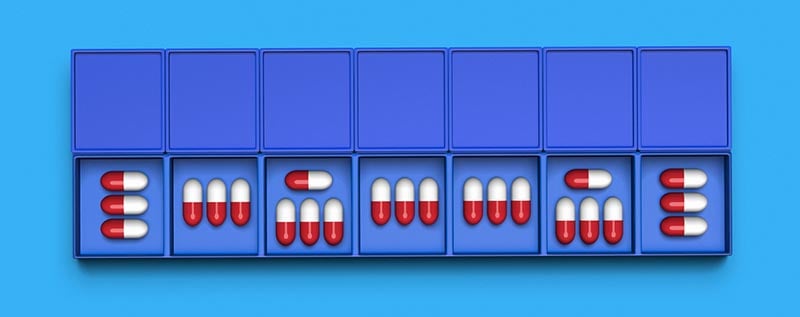Following Your Medication Routine Matters, Here's Why.

Staying adherent to your medication routine might seem like a simple task, but nearly 10 percent of hospitalizations and their cost are a result of not following a prescription regimen. Medication non-adherence is frequently perceived to be minor because of the lack of symptoms; however, non-adherence can lead to a decrease in quality of life and possible health consequences.
There are many reasons why medication non-adherence is so common. For some patients, the most difficult step is starting medication therapy. Because many conditions lack physical symptoms, patients may not feel the need to take the medication because they don’t feel anything is wrong with them.
Let’s take high blood pressure as an example. High blood pressure is the third most common condition in patients over the age of 50 and effects nearly 75 million Americans. The condition, unfortunately, also goes without symptoms until it reaches a serious stage where it severely effects the body’s main organs. There are often no warning signs or symptoms but could easily turn into heart disease or stroke if untreated.
There are many factors that can cause non-adherence. The most important solution is creating a unique routine to address your specific needs, while considering the obstacles that can get in the way of taking your medications.
Here are 5 suggestions to address and increase adherence to your medication routine.
1. Educate yourself on your medications and why they were prescribed.
The best way to stay adherent to your medications, is to understand why it is so important for you to take this medication in the first place. Before you begin your medication(s) you should be informed on questions, like:
- What am I taking this for?
- How long should I be on this medication?
- What is this medication doing to benefit my health?
- What happens if I miss my dose?
- What should I expect from this medication?
Before you leave your doctor’s office, be sure to ask each of these questions in advance. Your Pharmacist is also a great resource for these types of questions. Always accept their offer to counsel you on your medication management, so that you’re fully knowledgeable on your health.
2. Make the medication a part of your daily routine.
The hardest part about starting a new medication is figuring out where in your routine it will fit the best. Research has shown that by adding your medication to your daily routine, the risk of it being forgotten lessens.
For example, many people wake up in the morning, brush their teeth and get ready for the day. Try keeping your medication next to your dresser where you will see it after brushing your teeth. This will remind you to take your medication in the morning and the same can be done for your bedtime regimen, as well.
3. Enroll in a ready to refill program.
A ready to fill program is when your medications are automatically refilled for you when they are due. Enrolling in a ready to fill program allows the pharmacy to monitor your medication therapy and it allows you to see how many tablets you have left at the end of each month. If there are too many extra at the end of each month, it should be a reminder that you may have missed some of your doses. This can help decrease the likelihood of a missed refill and put you on the path to better health.
4. Ask your Pharmacist for advice.
If you are taking several medications, it’s worth speaking with your Pharmacist to see if you can take multiple medications at the same time to decrease the burden of remembering how many times per day you will need to take your medication. A lot of medications can be taken together in the morning or evening and by taking your medications all at once it will decrease the likelihood of you missing one of your medications.
5. Get a medication box organizer for daily use.
Medications are very easy to mix up, especially when you are taking many medications at once. The benefit of a medication organizer is that it prevents these errors and creates a visual representation of what medications need to be taken at what times.
There are many variations of medication organizers, so we recommend selecting an organizer that allows all your medications to be sorted correctly. If you have any questions, this can be taken to your doctor’s office at any time to go over what medications should be taken at what times.
Medication adherence will only get better if you are willing to take control of your condition or injury. Nothing will change unless you’re ready to fully understand the impact of taking the prescribed medication therapy.
At IWP, our team of Pharmacists are here to help patients like you better understand why you have been prescribed a medication and the benefit on your overall health. If you are in need of a Pharmacist consultation, please call us at 888-321-7945 or submit our Contact Us form today.
Other Posts You Might Be Interested In
Subscribe to email updates
Stay up-to-date on what's happening at this blog and get additional content about the benefits of subscribing.


